Steven L. Mabry: Veteran of the Month | February 2024
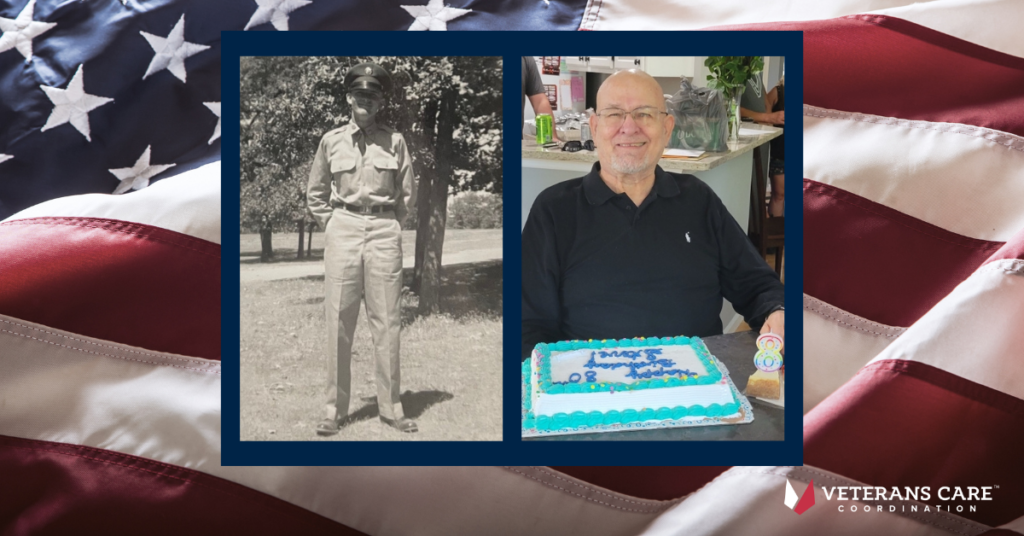
Born in 1943, Steven Mabry is the second oldest of four siblings. His family consists of one older brother and two younger sisters. He grew up in St. Louis, Missouri, after his parents moved there from Hornersville, Missouri, where they had worked on a farm picking cotton. Mabry explained, “My brother was born in the country on a dining room table. I was the first Mabry born in a hospital.” Mabry’s father did everything he could to provide for the family, from plowing neighboring fields to butchering hogs. When his father struggled to make a good living down south, the family moved to St. Louis, where he found work at Railway Express, which provided better opportunities and stability for the family.
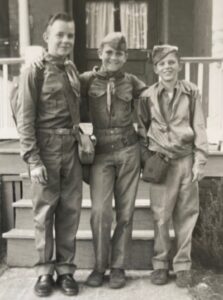
Mabry center with friends in Boy Scouts.
In St. Louis, Mabry’s father used to drive a tractor to pick up mail from Union Station that arrived in various train cars. He would then transport the mail underground using an elevator system. At that time, Union Station was connected to the St. Louis Post Office by underground tunnels. Mabry’s father would deliver the mail to the post office through these tunnels. Mabry explained, “Underground, where they would drive, was also where their locker rooms were and where they would eat lunch and things like that.”
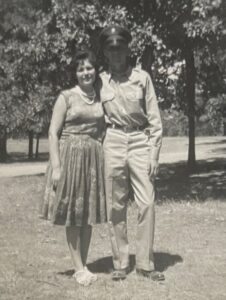
Mabry with his mother after graduating from basic training.
When Mabry reached high school age, a brand new technical school had just been built. He attended there for about a year, but he soon realized that he wasn’t good at working with his hands, particularly when the assistant principal suggested that he might do better in a traditional high school where he could learn typing. Mabry laughed, “So I did, and when computers came out, I was all ready!” Mabry had a great experience at McKinley High School despite its reputation for being a rough school. Mabry stated, “It was the best school I ever attended. All of the teachers were wonderful, and I did better in my grades.” While at McKinley, Mabry participated in the Distributed Education program, which allowed him to attend school and work at a hospital for half a day each. He started working at a hospital and gained valuable skills in everything from housekeeping to maintenance while working his way up. Mabry was even hired by a local contractor who was brought in to do construction in the hospital by adding oxygen lines to each room. Mabry would always contribute part of his pay to help the family, recalling, “We weren’t wealthy, but we always had food, clothing, shelter, and a little extra. I’ll give that to my parents. They worked their [tails] off.” Mabry explained that not only did his dad work nights for Railway Express, but he spent his days as a wallpaper hanger. During summer breaks, Mabry would lend a hand even though he admitted with a laugh he wasn’t very good at it and hated doing it.
Mabry joined the United States Army during the Vietnam War after graduating high school in 1962. He had a draft card and knew he had to make a decision. “All my buddies were getting drafted, and I knew I was going to get drafted, so I joined,” he explained. By enlisting, Mabry would have to serve for three years instead of the two years required when you were drafted, but he was told he could pick his military occupation. He had aspirations of becoming a military police officer or MP. After enlisting, he learned they didn’t have any MP positions open, which Mabry acknowledged, “They don’t always tell you the truth.” So Mabry was sent to Fort Leonard Wood, MO, for three months for basic training without knowing exactly what he would do for the Army over the next three years. After completing basic training, he was assigned to missiles, and laughed, stating, “My sergeant yelled, ‘How’d you pull that off?'”
Mabry on left and friend during basic training, 1962.
After receiving his Military Occupational Specialty (MOS), Mabry was sent to a Nike Hercules Missile base in Lemont, Illinois, for on-the-job training. The missile base was located next to the Argon National Laboratory. Mabry explained, “The Nike Hercules Missile Base was part of the artillery, so my MOS was artillery. In those days, there was a Nike Hercules Missile Base on all four sides of every major city. The Nike Hercules Missile Base was the last line of defense. They had a small nuclear-tipped missile with a range of about 50 to 100 miles.”
The Nike Hercules Missile system was a ground-based anti-aircraft guided missile system intended to detect, target, and neutralize enemy bombers with high accuracy. Its technology at that time made it a powerful artillery weapon in the Army’s arsenal, capable of delivering a 30-kiloton nuclear warhead. Mabry was part of the operations system, working as a DC Analog Computer Operator at the fire site. The launch site was underground, approximately a mile from the fire site. He would also track aircraft using a specialized board, indicating their speed and origin. His schedule was 24 hours on, 24 hours off, and every other weekend off.
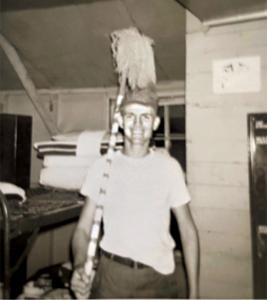
Mabry acting silly while cleaning the barracks.
After a year and a half, the National Guard took over the missile site in Lemont, so Mabry received orders to head to St. Bonifacious, Minnesota, right outside of St. Paul. Mabry spent the next eighteen months in Minnesota before being honorably discharged in 1965.
The Nike Missile bases located throughout the United States have been decommissioned, with most being repurposed, such as being turned into parks, schools, or storage facilities. Mabry stated, “In St. Bonifacious, Minnesota, they made a park for us and dedicated to us, and there were stories [told] we never even thought of.” Mabry explained how farmers in the area reminisced driving past the bases and were amazed and concerned about the “the kids in there who have their finger on a nuclear bomb.”
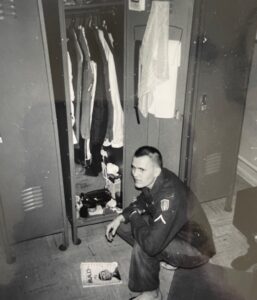
Mabry at his locker Dec 1964
Following his discharge, Mabry returned to St. Louis and started working at a finance company in collections. He was married in 1966 and a year later had his first son, Steve. In 1971, his second son, Greg, was born, and five years later, they welcomed their daughter, Stacy. Greg made the decision to serve his country after graduating high school, and joined the Marines in 1990. He spent four years in the military, during which time he was deployed to the Gulf War for Operation Desert Storm, Desert Shield, and Operation Restoring Hope.
Mabry worked his way up through the finance business for six years, even becoming the youngest manager of any finance company in the St. Louis area. Eventually, Mabry took a position with a military Credit Union and, in 1981, opened a company called Midwest Mailers. Mabry explained, “I mailed out most of the financial statements for the credit unions for the state of Missouri.” Mabry proudly described it as a family company where his wife and children were all employed.
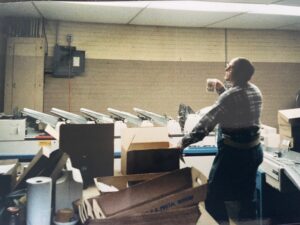
Mabry working at Midwest Mailers.
In the 1990s, Mabry divorced and started working as a process server, which soon developed into a career as a private investigator. He stated, “Back then, you did not need a license.” Mabry and a partner worked on three high-profile cases, even brought in by the FBI after retirement to discuss a case he had worked on. Most of his cases were divorce situations, child custody cases, and fraudulent disability cases. Mabry dedicated 12 years to serving as an alderman in Ballwin, MO. He also actively participated in the American Legion for 16 years, serving in multiple officer positions for the organization.
After retiring in 2002, Mabry spent time doing what he enjoys: fishing, range shooting, and riding his motorcycles. He also loves playing games online. He is now a proud grandfather of seven grandchildren and three great-grandchildren. Recently, Mabry has been using his skills and experience to give back to the community by volunteering to conduct background checks for a local church that is dedicated to charitable work.
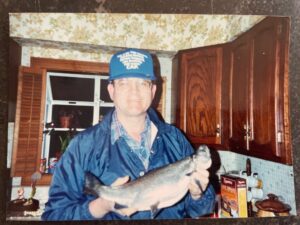
Mabry showing off his catch after a fishing trip.
When asked what the one thing he carried with him from his Army training was, Mabry quickly stated, “Discipline. If you’re told to do it, you do it. And if you have something to do that you don’t like doing, do it first. Get it out of the way and off your mind. I followed that my whole life.”
Source: www.themilitarystandard.com
